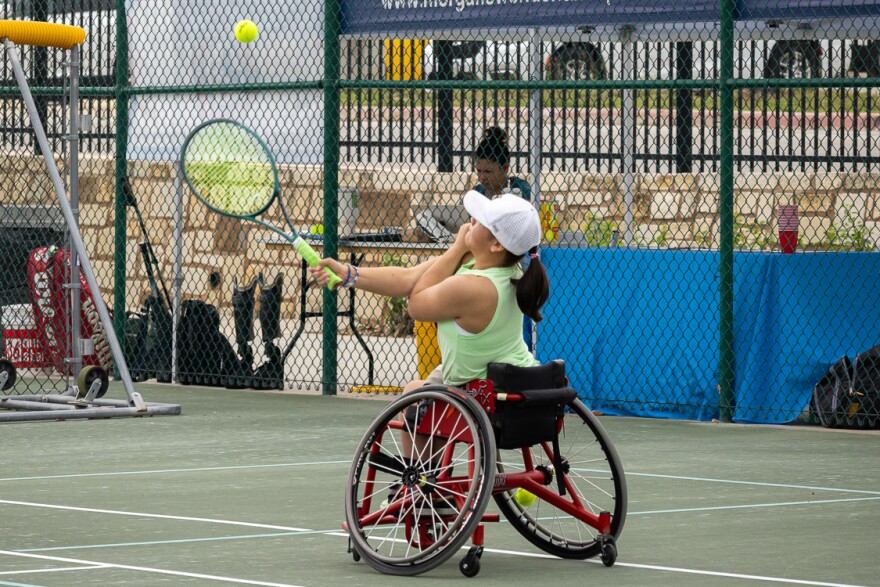Sign up for TPR Today, Texas Public Radio's newsletter that brings our top stories to your inbox each morning.
More than 300 athletes of varying abilities and disabilities from throughout Texas gathered in San Antonio last month to compete in the annual Texas Parasport Games. The competition in adaptive sports included tennis, rowing and archery, and they were held throughout Morgan’s accessible campus.
Dozens of these athletes lined up to participate in the archery competition at the STAR Soccer Complex, including San Antonio high school sophomore Callie Cline.
Callie is a lower left below-the-knee amputee. She said archery was a sport she quickly adapted to when she traded in horse riding for a bow and arrow.

“I like doing it, because since [I use] a leg prosthetic, it's easier for me to not have to run around in a sport like basketball or soccer that's very tedious on my legs,” she said. “Archery, just kind of like golf, you're competing against yourself and just your score, and you still have a really good team dynamic.”
Fifteen-year-old Azalia Sandoval of San Antonio is also an amputee and an award-winning archer. She couldn’t wait to take part in the parasport games.
“I'm a person that likes to try every sport,” she said. “So when I saw it, I was like, ‘Hey, Mom, I want to try it out, see how I do.’ And she was like, ‘Okay, let's do it.’”

At the tennis court, dozens of people competed on the court, including middle school student Lily Terall from Spring Branch, who lives with spina bifida. She competed in shotput and tennis. On the court, she wielded the tennis racket and wheelchair simultaneously with ease.
“It feels amazing. You're getting the exercise, and you're getting happy, and you're getting the sunlight and having fun at the same time,” she explained.
This first-time rowing competitor is proving you don't have to finish first,you just have to finish. At the Texas Parasport Games in San Antonio.
— Jackie Velez - Texas Public Radio (@jvelezsa.bsky.social) 2025-04-25T16:03:53.730Z
The rowing competition was held at Morgan’s Multi-Assistance Center.
Instead of rowing in a lake or a river, participants used adapted rowing machines that computed who was working the hardest and moving the fastest.
Contestants had to complete 500 meters. First-time rowing competitor Tina Lavalle was cheered on and was overcome with emotion at the virtual finish line.
“I did this!” she said. "I want to cry happy tears. I didn't think I could do it. I'm exhausted. I finished. I did it!”
Texas Parasports awarded some lucky competitors with accommodating equipment to aid in their adaptive sports.
Linden Williamson, a neuroscience researcher in San Antonio and recent Boston Marathon participant, was awarded a new racing wheelchair. She hoped to use it to qualify for the U.S Para Track & Field National Championships.

“Having individualized equipment that fits me perfectly will allow me to really excel on the track without the barriers of expensive equipment,” Williamson explained.
The Texas Parasport winners will compete in the national championships this summer.





